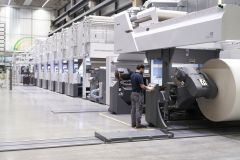Heidelberg has just signed the United Nations Global Compact. Launched in 2000, this pact between the private sector and the United Nations is the largest international initiative for sustainable development and corporate social responsibility (CSR), with 19,000 members from 164 countries. Voluntary, "its mission is to stimulate change and promote the sustainability of companies and encourage innovative solutions and partnerships" says the organization's website.
With this membership, the German manufacturer of printing presses and equipment underpins its commitment to align its corporate strategy with the ten sustainability principles of the United Nations Global Compact, covering human rights, international labor standards, environmental protection and anti-corruption.
Objective: carbon neutrality at all Group sites
"We see our participation in the UN Global Compact as a logical step in our efforts to minimize our environmental footprint along the entire value chain in our business sector. The Group has already actively promoted environmental protection and social responsibility in the past, and will further strengthen these efforts by becoming a member of the UN Global Compact." said Ludwin Monz, CEO of Heidelberg.
The 9,500-employee German group has already committed to achieving carbon neutrality (scope 1, i.e. direct emissions from combustion, and scope 2, i.e. indirect emissions from electricity) at its production, development and sales sites by 2030.
Last September saw the commissioning of the Group's largest photovoltaic plant at Heidelberg's Amstetten site in Austria.













